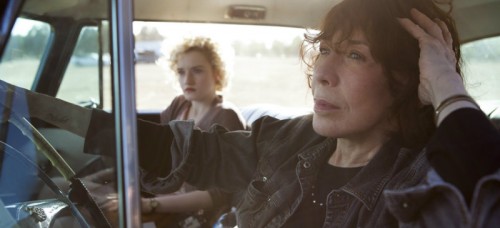
During the troubled teenage years, grandparents are there for kids when their parents ultimately just don’t understand, and are a stable beacon of reliance. But that’s the opposite for Ellie (played by Lily Tomlin), in the comedy-drama “Grandma,” as her granddaughter, Sage (Julia Garner), comes to her to ask for money for an abortion, only to find Ellie in a state of emotional crisis with absolutely no money.
The relatively short film was filled with amazingly acted chapters, in which Ellie returns to people from her past in an attempt to get money. The way the film was broken up, while keeping the same themes of forgiveness, was a good way to set up the film, with the only people who remain constant in Ellie’s life — her granddaughter, daughter and girlfriend — appearing in more than one chapter.
Each chapter featured extraordinary actors, including the notable Sam Elliot as Karl, Ellie’s former boyfriend, but Tomlin, Garner, Marcia Gay Harden, who played Ellie’s daughter and Sage’s mother, Judy, and Judy Greer as Ellie’s girlfriend, Olivia, shone in their respective roles. Garner’s portrayal of Sage was beautifully acted — especially throughout the scenes where she questions her choice to go through with the abortion, but as the title suggests, Lily Tomlin stole the film. Her impeccable portrayal of Ellie, the feisty and fearless grandma we all wish we had, leads me to wonder why she hasn’t had a starring role in years.
In addition to the fantastic acting by the leads (and supporting cast as well; everyone was great), the beautifully shot film will make viewers nostalgic for the West Coast, even if they’ve never been there. Even though Ellie and and Sage are in a rush throughout the whole film, the beautiful shots filmed throughout multiple Los Angeles neighborhoods gave off a laid back, California vibe that persisted throughout the film.
In a genre where films dealing with abortion normally results in the mother reconsidering and keeping her child, “Grandma” is a film that sticks to its intentions. Sage doesn’t go back on her abortion, but the film is refreshingly honest in portraying the struggles she dealt with in her decision to go through with it. Although she wavers on her decision, she ultimately comes to the realization that her life would be better going through with the procedure.
The film is a feminist masterpiece without even trying, confronting modern day issues by essentially not confronting them. No big deal was made by Ellie about the fact that Sage was pregnant, she understands that teenagers have sex; there’s no shock or hurt by Elliot’s Karl that Ellie left him for a woman, that’s just who she fell in love with; and the female-led film passes the Bechdel test with flying colors — within the first few minutes, even. One of the best things this film does, though, is solidify Tomlin’s place as an American treasure, as she is one of the rare actresses who could capture the spirit of Ellie so perfectly.

